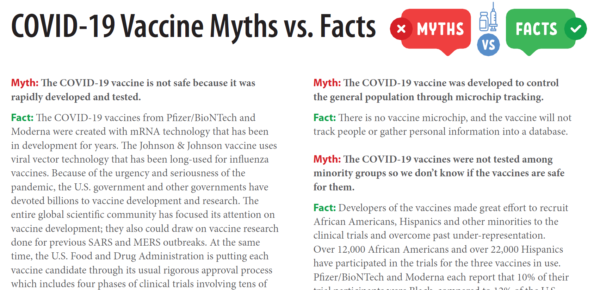COVID-19 Vaccine Myth vs. Fact
Debunking common falsehoods
With a host of misinformation about COVID-19 vaccines circulating, here are possible responses to popular myths you might hear from your patients, friends or family. Get the facts and be safe.
UPDATED July 2021
Myth: The COVID-19 vaccine is not safe because it was rapidly developed and tested.
Fact: The COVID-19 vaccines from Pfizer/BioNTech and Moderna were created with mRNA technology that has been in development for years. The Johnson & Johnson vaccine uses viral vector technology that has been long-used for influenza vaccines. Because of the urgency and seriousness of the pandemic, the U.S. government and other governments have devoted billions to vaccine development and research. The entire global scientific community has focused its attention on vaccine development; they also could draw on vaccine research done for previous SARS and MERS outbreaks. At the same time, the U.S. Food and Drug Administration is putting each vaccine candidate through its usual rigorous approval process which includes four phases of clinical trials involving tens of thousands of people; no shortcuts are being taken. Clinical trials for the Pfizer/BioNTech and Moderna vaccines have shown 94% effectiveness and minimal side effects. The Johnson & Johnson vaccine is 67% effective against symptomatic COVID-19. Most importantly, in our experience of administering the vaccine to nearly 200 million Americans, the vaccine is proving highly effective in preventing serious illness or death.
Myth: There are severe side effects of the COVID-19 vaccines.
Fact: The COVID-19 vaccine can have side effects, but the vast majority are very short term—not serious or dangerous. Some people experience pain at the injection site, along with body aches, headaches or fever, lasting for a day or two. These are signs that the vaccine is working to stimulate your immune system as it was designed to.
Myth: Getting the COVID-19 vaccine gives you COVID-19.
Fact: The vaccine for COVID-19 cannot and will not give you COVID-19. The mRNA vaccines instruct your cells to reproduce a protein that is part of the SARS-CoV2 coronavirus, which helps your body recognize and fight the virus, if it comes along. The COVID-19 vaccine does not contain the SARS-CoV2 virus, so you cannot get COVID-19 from the vaccine. The protein that helps your immune system recognize and fight the virus does not cause infection of any sort.
Myth: COVID-19 vaccines will alter my DNA.
Fact: The Pfizer and Moderna vaccines work by instructing cells in the body how to make a protein that triggers an immune response. Injecting mRNA into your body will not interact or do anything to the DNA of your cells. Human cells break down and get rid of the mRNA soon after they have finished using the instructions.
Myth: The COVID-19 vaccine was developed to control the general population through microchip tracking. Fact: There is no vaccine microchip, and the vaccine will not track people or gather personal information into a database.
Myth: The COVID-19 vaccines were not tested among minority groups so we don’t know if the vaccines are safe for them.
Fact: Developers of the vaccines made great effort to recruit African Americans, Hispanics and other minorities to the clinical trials and overcome past under-representation. Over 12,000 African Americans and over 22,000 Hispanics have participated in the trials for the three vaccines in use. Pfizer/BioNTech and Moderna each report that 10% of their trial participants were Black, compared to 12% of the U.S. population. For Hispanics, while they represent 18% of the population, they comprised 26% of Pfizer trial participants and 20% of Moderna participants. In the Johnson & Johnson trial, 15% were Hispanic and 13% were Black. No difference in efficacy is reported between whites and people of color for any of the vaccines. And, the lead scientist in COVID-19 vaccine development at the National Institute of Allergy & Infectious Diseases is an African American, Kizzmekia Corbett.
Myth: COVID-19 vaccines were developed using fetal tissue.
Fact: None of the vaccines contain fetal cells nor were fetal cells used in development or production.
Myth: COVID-19 vaccines cause infertility or miscarriage.
Fact: COVID-19 vaccines have not been linked to infertility or miscarriage by any scientifically plausible study or by any experience to date.
References
- COVID-19 Vaccines: Myth Versus Fact. Johns Hopkins University. https://www.hopkinsmedicine.org/health/conditions-and-diseases/coronavirus/covid-19-vaccines-myth-versus-fact
- COVID-19 Vaccine Myths Debunked. The Mayo Clinic. https://www.mayoclinichealthsystem.org/hometown-health/featured-topic/covid-19-vaccine-myths-debunked
- Frequently Asked Questions about COVID-19 Vaccination. Centers for Disease Control. https://www.cdc.gov/coronavirus/2019-ncov/vaccines/faq.html
- Fact Sheet: Explaining Operation Warp Speed. U.S. Dept. of Health and Human Services. https://www.hhs.gov/coronavirus/explaining-operation-warp-speed/index.html
- Eight Myths About the COVID-19 Vaccine. CNN. January 26, 2021. https://www.cnn.com/2021/01/26/health/covid-19-myths-vaccine-wellness/index.html
- Racial Diversity within COVID-19 Vaccine Clinical Trials: Key Questions and Answers. Kaiser Family Foundation website, Jan. 26, 2021.https://www.kff.org/racial-equity-and-health-policy/issue-brief/racial-diversity-within-covid-19-vaccine-clinical-trials-key-questions-and-answers



